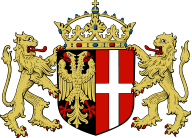 Neuss
NeussHistorisch
The Revolution of 1848 and the people’s assembly in Neuss
The Revolution of 1848 and the rally in Neuss
In 1848, the municipal meadows outside of the former Hesse Gate were a central location of the revolution in the Rhineland. Many thousand people assembled here on 10 September 1848 in a first major gathering of democrats of the left Lower Rhine region. In the afternoon, they listened to speeches by prominent representatives of Democrats’ Associations and People’s Clubs such as Josef Herzfeld (Neuss), Ferdinand Lassalle (Düsseldorf) and Heinrich Bürgers (Cologne) – the latter two close acquaintances of Karl Marx.
The speakers criticised the new statutes on civil militias, and especially Lassalle the cessation of hostilities between Prussia and Denmark. The protesters argued the case for German unity and called upon the National Diet of Frankfort, in session at the same time, to defend the achievements of the March Revolution, i.e. government by the people. Afterwards the crowds marched through the town. For Neuss, this rally of 5,000 to 10,000 participants was a major event, considering that its population then numbered just over 9,000 inhabitants. While the police report referred to “riots”, the city’s mayor Adam Breuer spoke of a peaceful meeting.
The civic-democratic revolution of 1848 was a European event that had started in France in the February of that year. Since then, Baden, Saxony, Berlin and the Prussian Rhineland had become increasingly politicised. The people demonstrated for democratic reforms of both the military and the judiciary, for freedom of the press, a parliament of the people, national unity and the abolition of the monarchy. The large rally in Neuss was followed in September 1848 by similar gatherings in Krefeld, Cologne and on the Rhine meadows near Worringen.
Neuss remained a stronghold of the revolution with the meeting place in the inn of publican Reiner Lucas, where on 21 November 1848 Ferdinand Lassalle called for armed resistance against the threatened siege. His call remained unheard, but his speech resulted in Lassalle’s arrest. However, several more such gatherings followed in Neuss. On 10 May 1849, 2000 protesters marched from Gladbach to Neuss. When additional armed forces were stationed in the city because of a feared attack on the armoury, the marchers surrendered. The Neuss democrat Josef Herzfeld fled to America.
The revolution of 1848/49 had not yet led to a breakthrough for democracy, but paved the way for the developments of the subsequent decades: the unification of Germany and the establishment of a constitutional state in Prussia. Neuss, too, played its part in this – not least with the rally on the meadows outside of the Hesse Gate.
Timeline
- February 1848 February Revolution in France
- March 1848 March Revolution in Prussia and other German states
- May 1848 Citizens of Neuss who believe in democracy establish the Democratic
- 18 May 1848 The German National Assembly meets in St. Paul’s Church in Frankfurt.
- Club.
- 22 May 1848 The Prussian Constituent National Assembly meets in Berlin.
- 10 September 1848 Large gathering of the democratic unions in the park in front of the Hesse Gate
- 21 November 1848 At a meeting, Lassalle calls for resistance by the citizens of Neuss.
He is arrested the following day. - 5 December 1848 The Prussian King Frederick William IV. dissolves the Prussian National Assembly and imposes a constitution.
- 3 April 1849 Frederick William IV. refuses the German imperial crown offered by the German National Assembly.
- 10 May 1849 Thousands of democrats march to Neuss from surrounding towns. However, they abandon their plans to storm the arsenal (Zeughaus).
- 30 May 1849 Three-class electoral system is introduced in Prussia
Sources and texts: Neuss municipal archives
Graphic design: Cornelius Uerlichs
Translation: A.C.T. Fachübersetzungen GmbH
This plaque was donated by: FORUM Archiv und Geschichte e.V. · Michael Hohlmann, Member of the Committee on Culture of the City of Neuss · SPD Neuss · Ministry for Regional Identity, Communities and Local Government, Building and Gender Equality of the Land of North Rhine-Westphalia
